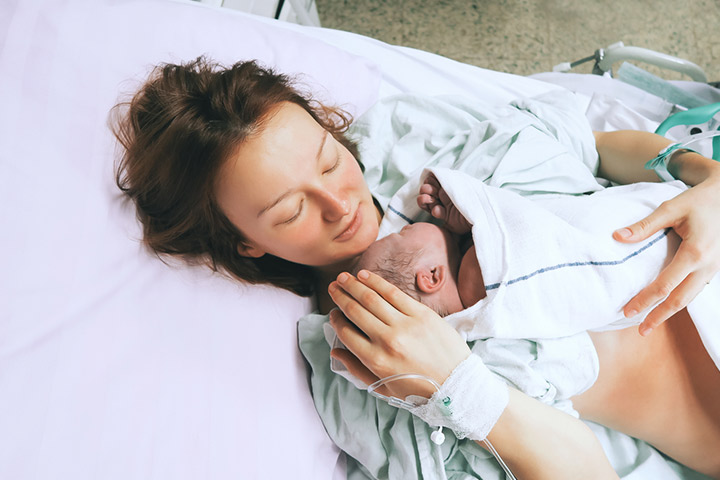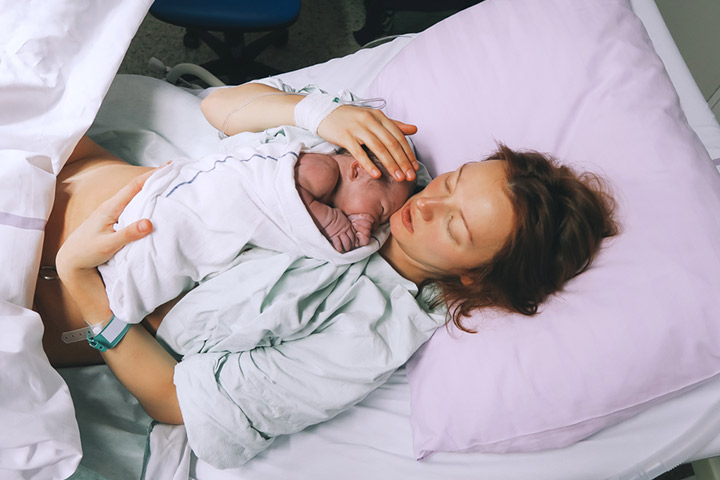
Image: Shutterstock
Pregnancy and childbirth can be a different experience for each mum, and hence the recovery period can also vary. The postpartum recovery timeline can be different for each new mum depending on several factors such as how long the labor was, how long you pushed, and if it was normal delivery or C-section. Most mothers are usually unaware of what to expect after childbirth. In this post, we discuss what your body goes through and what to expect in the first hour, day, week, and months after childbirth.
The First Hour After Giving Birth
Image: Shutterstock
The first hour after you give birth, your baby will be placed on your belly for skin-to-skin contact. Your doctor will then check your perineum. If you had any tears or had an episiotomy, you will require stitches. A nurse or midwife will check the pulse and blood pressure of your baby and you. Your doctor or midwife will also inspect for any blood loss (1). If you are choosing to breastfeed, your baby will most likely have his/her first breastfeeding session during this time. A nurse will be there to assist you in breastfeeding your little one. You can also seek help from a lactation consultant if you face any issues with breastfeeding.
The First Day After Giving Birth
Image: Shutterstock
If you had a normal delivery, you will be required to stay in the delivery room for about 2 hours. After that, you will either be transferred to the postnatal ward or will be allowed to go home. Women who leave the hospital within 4 to 6 hours after childbirth are usually kept in the birth room until they are discharged.
The first 24 hours after birth can be challenging for most women as they go through a range of emotions from elation to emotional and physical exhaustion. You will also experience bleeding from down there. This bleeding is known as lochia and is similar to your menstrual cycle. It will last for about 4 to 6 weeks. However, if you notice any clots as big as the size of a 50 cent coin, it’s best to inform your healthcare provider right away (2).
Along with the bleeding, it’s also normal to experience after-birth pains. This is caused when your uterus shrinks back to its pre-pregnancy size, though it can take a while. So, if you feel slight pain similar to that of menstrual cramps, know that this is normal. If this isn’t your first time giving birth, the after-birth pain tends to be a little intense and stronger. Using a warm compress might help provide some relief.
You need to take extra care of your perineum as it will be swollen in the first 24 hours after childbirth. Rest as much as you can by lying down. Applying an ice pack over the region every few hours will help calm down the pain and swelling. Make sure you stay hydrated by drinking enough water and following a well-balanced diet rich in fibers. If you are having trouble going to the loo, make sure not to strain yourself. Feel free to ask your doctor for a stool softener.
If you’ve had stitches in the perineum, it will most likely dissolve in about 2 weeks. Make sure to take extra care by washing the area as you normally do and only pat dry.
The First Few Weeks After Giving Birth
Image: Shutterstock
Your postpartum period can last anywhere between 6 to 8 weeks. Take your time to adjust to this new role and allow your mind and body the rest it deserves.
Rest
Resting may be a lot trickier once you have a fussy infant on your hands. Though babies sleep through a lot in the initial months, it may not seem like it since they wake up every few hours. Between changing, comforting, and feeding them, you will get very little time to yourself. Since a solid 8 hours of sleep may not be possible, power naps will be your best friend. Rest whenever your baby sleeps. It’s important to prioritize your sleep over everything else.
Nutrition
Most new mums might be in a hurry to shed the extra kilos gained during pregnancy. But it’s important to take it slow and steady as your body is still recovering from pregnancy and childbirth. It’s important to follow a healthy diet that includes fiber, protein, fruits, and vegetables. Breastfeeding mums especially need all the nutrients and minerals they can get during lactation.
Mental Health
Most women may experience baby blues for the first few days after giving birth. Baby blues can be described as a feeling of sadness, anxiety, irritability, or crying. The transition from being a pregnant woman to a mom can be challenging for some. If you are feeling low or sad, it will go away within 2 weeks (3).
But if the feeling continues to persist even after several weeks, it’s best to consult a doctor as what you must be experiencing could be postpartum depression. Postpartum depression is usually diagnosed within the first year of giving birth. Prompt treatment and emotional support are needed in such cases.
A newborn requires constant time and energy from parents, and it can be exhausting especially if you are a new mom. It’s important to prioritize your physical and mental health during such a time because only a healthy mom can best take care of her baby.















